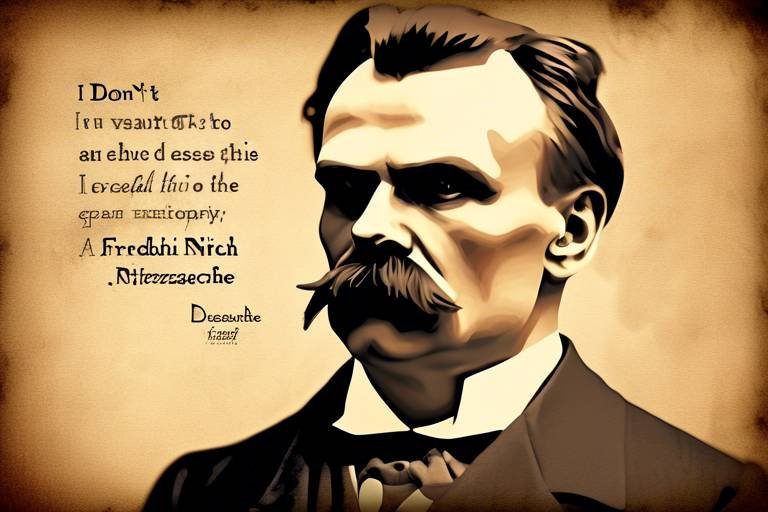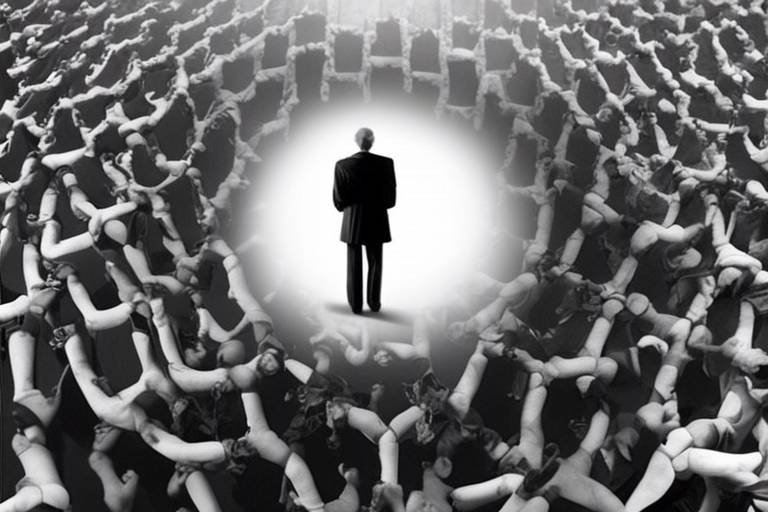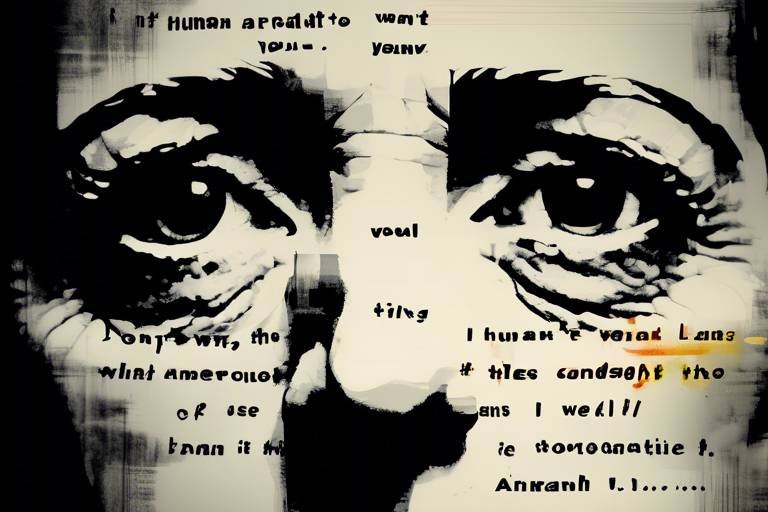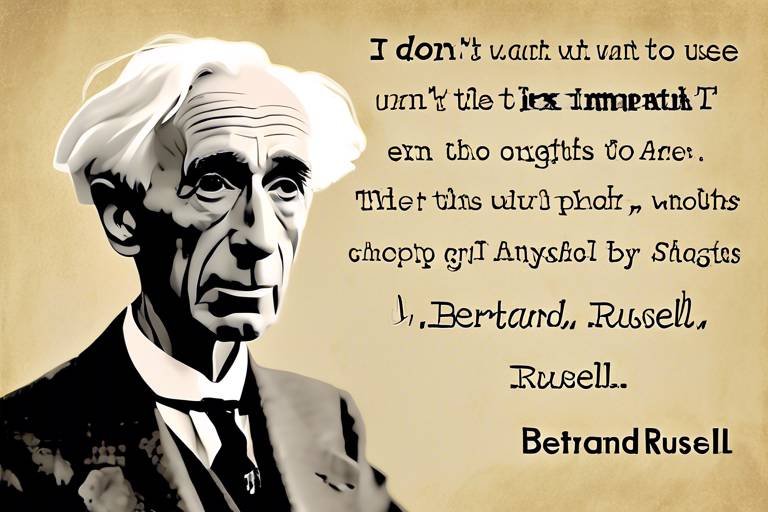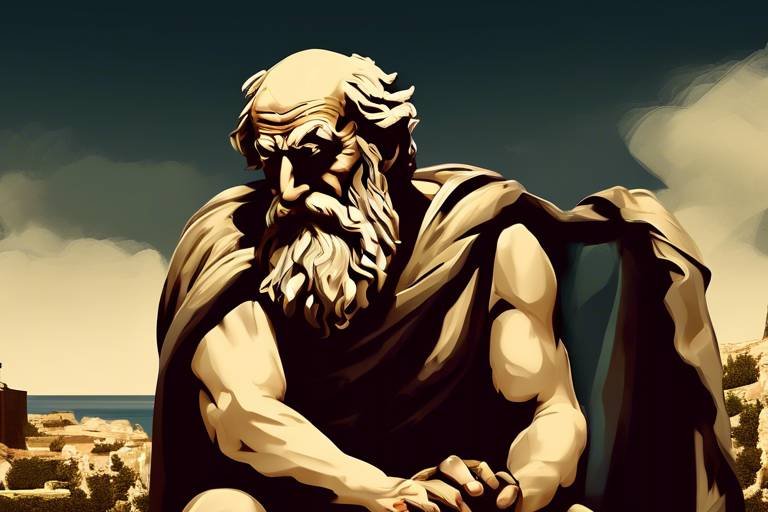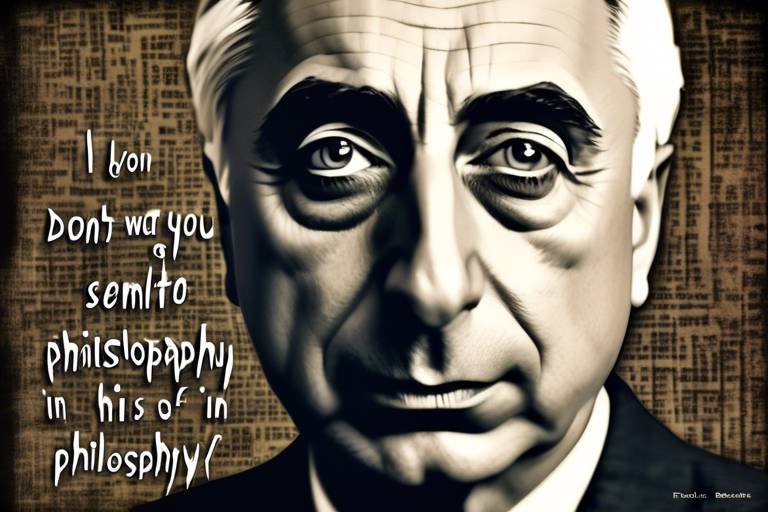The Philosophical Concepts of Determinism, Free Will, and Fate
The relationship between determinism, free will, and fate is one of the most intriguing and debated topics in philosophy. It's like a tangled web where each concept influences the others, creating a complex interplay that has puzzled thinkers for centuries. Have you ever wondered if your choices are truly your own, or if everything is predetermined by the universe? This article aims to peel back the layers of these philosophical concepts, exploring their definitions, implications, and the rich debates that have surrounded them throughout history.
At its core, determinism is the idea that every event or action is the result of preceding events and natural laws. Imagine a row of dominoes; when one falls, it inevitably causes the next to tumble. This analogy perfectly captures the essence of determinism: everything is connected in a chain of cause and effect. There are several types of determinism to consider:
- Causal Determinism: This is the most common form, suggesting that every event is necessitated by preceding events and conditions.
- Logical Determinism: This perspective holds that propositions about the future are either true or false, making the future already determined.
- Theological Determinism: This view posits that a divine being has predetermined everything that happens in the universe.
Each of these forms poses significant philosophical implications, particularly regarding moral responsibility. If our actions are predetermined, can we truly be held accountable for them? This question invites a deeper exploration into the nature of free will and how it interacts with determinism.
Free will is often defined as the ability to make choices unconstrained by external factors. It’s the feeling we get when we decide what to have for breakfast or which movie to watch on a Friday night. But what if those choices are merely illusions? This section dives into various interpretations of free will, contrasting it with determinism. Some argue that free will is an essential aspect of human nature, while others believe that our choices are influenced by our upbringing, society, and biology.
Compatibilism is an intriguing position that suggests free will and determinism can coexist. It proposes that even if our actions are determined, we can still act freely as long as we are not coerced or constrained. Think of it like choosing a dish from a menu; while the options are limited, your choice still reflects your preferences. Compatibilists argue that this understanding allows for moral responsibility, as individuals can still make choices based on their desires and intentions.
Supporters of compatibilism present several compelling arguments:
- Significance of Choice: They emphasize that the act of choosing is what matters, regardless of the underlying determinism.
- Intention in Decision-Making: The intentions behind our choices play a crucial role in assessing moral responsibility.
However, compatibilism is not without its critics. Detractors from both determinist and libertarian perspectives challenge the authenticity of free will under this framework. They argue that if our choices are ultimately determined, then the notion of free will becomes a mere illusion. This ongoing debate raises essential questions about the nature of human agency and accountability.
Libertarian free will takes a different stance, asserting that individuals can make genuinely free choices that are not predetermined. This perspective emphasizes the idea that we have the power to choose differently in identical situations. Proponents argue that this freedom is essential for moral responsibility, as it implies that we are the authors of our actions. However, critics point out that this view struggles to coexist with the scientific understanding of causality and the laws of nature.
Fate is often viewed as a predetermined course of events, suggesting that our lives are mapped out in advance, beyond our control. This concept raises intriguing questions about human agency and the extent to which we can influence our destinies. Fate is frequently depicted in literature and mythology, presenting the notion that some events are destined to occur regardless of our choices.
Different philosophical traditions offer varying interpretations of fate. In some cultures, fate is seen as a guiding force, while in others, it is viewed as a restrictive element that limits human freedom. For example, in ancient Greek philosophy, the Moirai (Fates) were believed to control the destinies of individuals, while in Eastern philosophies, the concept of karma suggests that our actions influence our future circumstances.
The tension between fate and free will is a classic philosophical dilemma. On one hand, if everything is fated, what role do our choices play? On the other hand, if we possess free will, how can we reconcile that with the idea of a predetermined fate? This ongoing struggle has influenced human behavior and decision-making throughout history, prompting individuals to ponder their place in the universe and the extent of their control over their lives.
- What is the difference between determinism and fatalism? Determinism suggests that events are determined by preceding events, while fatalism implies that outcomes are predetermined and inevitable, regardless of our actions.
- Can free will exist in a deterministic universe? Yes, according to compatibilism, individuals can still have free will even if their actions are determined by prior causes.
- Is fate the same as destiny? While often used interchangeably, fate refers to a predetermined outcome, whereas destiny can imply a potential that may be realized through choices.

Understanding Determinism
At its core, determinism is the philosophical doctrine that asserts every event or action is the inevitable result of preceding events and natural laws. Imagine a vast, intricate machine where each gear and cog influences the next; this is how determinism perceives the universe. Every choice we make, every action we take, is not a spontaneous decision but rather a consequence of a series of prior states and conditions. This perspective raises profound questions about the nature of human agency and moral responsibility. Are we merely puppets dancing on strings pulled by the hands of fate, or do we have some semblance of control over our lives?
There are several types of determinism that philosophers have explored, each with unique implications:
- Causal Determinism: This is the most commonly discussed form, which posits that every event is necessitated by antecedent events in accordance with the laws of nature. Think of it like a chain reaction; one event leads to another, creating a continuous flow of cause and effect.
- Logical Determinism: This suggests that the future is already determined by the truth values of propositions. If a statement about the future is true, then that future must occur, which raises questions about the nature of truth and knowledge.
- Theological Determinism: This perspective holds that a divine being has predetermined every event in the universe. It intertwines with religious beliefs, suggesting that free will is an illusion since a higher power has already mapped out our paths.
The implications of determinism extend into various domains, including ethics, psychology, and even law. If our actions are predetermined, can we truly be held accountable for them? This question has sparked endless debates among scholars, ethicists, and everyday individuals alike. Some argue that understanding determinism can foster a sense of compassion and understanding toward others, as it suggests that their actions are not entirely within their control. Others fear that it may lead to fatalism—a belief that one’s actions are meaningless because the outcome is already decided.
Despite its compelling nature, determinism faces significant challenges. Critics argue that it undermines the very essence of human experience. After all, don’t we often feel like we’re making choices? The tension between feeling free and the deterministic framework is akin to the age-old struggle between the heart and the mind. As we delve deeper into these philosophical waters, we encounter the intricate dance between determinism, free will, and fate—each concept influencing and challenging the other in profound ways.

The Nature of Free Will
When we talk about free will, we're diving into a deep ocean of philosophical inquiry. It's the idea that we, as individuals, possess the ability to make choices that are not merely the result of prior events or external influences. Imagine standing at a crossroads, where each path represents a different choice. This metaphor captures the essence of free will: the ability to choose your direction, unshackled from the chains of fate or determinism. But is it really that simple? Can we genuinely claim to be the architects of our destiny?
The debate around free will is as vibrant as a bustling marketplace, filled with differing opinions and interpretations. Some argue that free will is an illusion, a comforting story we tell ourselves to cope with life's unpredictability. Others assert that our capacity for choice is fundamental to our identity as human beings. This dichotomy raises several intriguing questions: If our choices are influenced by our environment, genetics, and past experiences, can we still say we are truly free? Or are we simply players in a predetermined script, acting out roles assigned to us by forces beyond our control?
To understand the nature of free will, we must explore its various interpretations. Broadly speaking, free will can be categorized into two main perspectives: libertarianism and compatibilism. Libertarians argue that free will exists in its purest form, allowing individuals to make choices independent of any deterministic framework. On the other hand, compatibilists believe that free will can coexist with determinism, suggesting that even if our actions are influenced by prior events, we can still exercise a form of choice that holds moral significance.
Consider the following table that summarizes the key differences between these perspectives:
| Aspect | Libertarian Free Will | Compatibilism |
|---|---|---|
| Definition | Choice is entirely free and unconstrained. | Choice exists within a deterministic framework. |
| Moral Responsibility | Individuals are completely responsible for their actions. | Responsibility is based on intentions and choices. |
| Influence of Prior Events | Prior events do not determine choices. | Prior events can influence but do not dictate choices. |
As we navigate through these concepts, it becomes clear that the nature of free will is not merely an academic exercise; it has real-world implications. For instance, our legal systems are predicated on the assumption that individuals have the capacity to make choices and should be held accountable for their actions. If we were to embrace a strictly deterministic view, the very foundation of justice could crumble, leading to a society where accountability is a mere illusion.
Ultimately, the nature of free will challenges us to reflect on our own lives. Are we truly the masters of our fate, or are we simply responding to a complex web of influences? This question invites us to explore the delicate balance between autonomy and determinism, pushing us to reconsider how we view our decisions and the consequences that follow. In a world filled with uncertainty, the quest for understanding free will remains a captivating journey, urging us to seek clarity amidst the chaos.
- What is free will? Free will is the ability to make choices that are not determined by prior events or external factors.
- What is the difference between libertarianism and compatibilism? Libertarianism posits that free will exists independently of determinism, while compatibilism suggests that free will can coexist with deterministic influences.
- How does free will relate to moral responsibility? Free will is often seen as a prerequisite for moral responsibility, as it implies that individuals can be held accountable for their choices.

Compatibilism
Compatibilism is a fascinating philosophical stance that attempts to bridge the seemingly insurmountable chasm between determinism and free will. At its core, compatibilism asserts that the two concepts are not mutually exclusive; rather, they can coexist harmoniously. This perspective invites us to reconsider the nature of our choices and the extent of our autonomy. Imagine being on a roller coaster: while the path is predetermined by the ride's design, your experience of the ride—your screams, laughter, and thrill—are entirely your own. This analogy captures the essence of compatibilism, where our choices, though influenced by external factors, remain authentically ours.
Philosophers like David Hume and Daniel Dennett have championed compatibilism, arguing that the ability to act according to one's desires and intentions is what constitutes true freedom. They suggest that even if our actions are ultimately determined by prior causes, we still possess the capacity to make choices that reflect our personal values and desires. This leads to the question: if we can act in accordance with our motivations, does it matter whether those motivations were predetermined? Compatibilists would argue that it does not, emphasizing that moral responsibility hinges on our ability to act in line with our intentions.
However, the implications of compatibilism extend beyond mere philosophical debate; they touch upon our everyday lives and ethical considerations. For instance, when we hold someone accountable for their actions, we often do so based on their intentions and choices. If compatibilism holds true, then our legal and moral frameworks may need to adapt, recognizing that individuals can be both determined and free at the same time. This duality can be a source of empowerment, allowing us to take ownership of our actions while acknowledging the influences that shape them.
Despite its compelling arguments, compatibilism is not without its critics. Detractors argue that if all our choices are influenced by prior events, then true freedom is an illusion. They challenge the notion that we can be held morally responsible if our decisions are merely the result of a chain of causation. This ongoing debate raises essential questions about the nature of human agency and the ethical implications of our actions. As we navigate these philosophical waters, it's crucial to understand that compatibilism offers a unique lens through which we can examine our lives, our choices, and the forces that shape them.
In summary, compatibilism provides an intriguing perspective that encourages us to rethink our understanding of freedom and determinism. By accepting that our choices can be both influenced by external factors and authentically our own, we can foster a richer understanding of human behavior and moral responsibility. So, the next time you find yourself pondering the nature of your choices, remember the roller coaster analogy—your ride may be predetermined, but how you experience it is entirely up to you.

Arguments for Compatibilism
Compatibilism, at its core, argues that free will and determinism are not mutually exclusive. This perspective provides a fascinating lens through which we can view human behavior and moral responsibility. One of the most compelling arguments for compatibilism is that it redefines free will in a way that is compatible with a deterministic universe. Instead of seeing free will as the ability to act independently of all influences, compatibilists suggest that it is the capacity to act according to one’s desires and intentions, even if those desires are shaped by prior events.
For instance, imagine a person deciding to go for a run. A determinist might argue that this choice was influenced by past experiences, such as a commitment to fitness or previous encouragement from friends. However, a compatibilist would assert that as long as the individual acted according to their own motivations, they exercised their free will. This interpretation emphasizes the importance of internal motivations over external constraints, allowing for a meaningful form of choice even within a deterministic framework.
Another argument for compatibilism revolves around moral responsibility. If we accept that our actions are determined by prior causes, it raises the question: can we still hold individuals accountable for their actions? Compatibilists argue that moral responsibility is based on the capacity to act in accordance with one's desires and to understand the consequences of one's actions. This means that even if our choices are influenced by previous events, we can still be held responsible for them, as long as we are capable of reflecting on our decisions.
Furthermore, compatibilism allows for a more nuanced understanding of human behavior. It acknowledges that while our choices may be influenced by a variety of factors—including genetics, environment, and personal history—this does not negate the reality of our decision-making processes. In fact, it enhances our understanding of how humans navigate complex situations, making decisions that are not just random but are deeply rooted in their unique experiences.
To illustrate the arguments for compatibilism, consider the following table that summarizes key points:
| Argument | Description |
|---|---|
| Redefinition of Free Will | Free will is seen as acting according to one's desires, not as independence from all influences. |
| Moral Responsibility | Individuals can be held accountable for their actions as long as they understand their consequences. |
| Nuanced Understanding | Human behavior is complex, influenced by various factors, yet still allows for meaningful choices. |
In conclusion, compatibilism offers a compelling framework that harmonizes the concepts of free will and determinism. By emphasizing internal motivations and the capacity for moral responsibility, it provides a rich understanding of human agency. This perspective not only enhances our philosophical discourse but also impacts how we view ourselves and our actions in the world.
- What is compatibilism? Compatibilism is the philosophical view that free will and determinism can coexist. It suggests that individuals can make choices based on their desires, even if those desires are influenced by prior events.
- Can we be morally responsible if determinism is true? Yes, compatibilists argue that as long as individuals can reflect on their decisions and understand the consequences, they can be held morally responsible for their actions.
- How does compatibilism differ from libertarian free will? Libertarian free will asserts that individuals can make choices that are completely free from prior causes, while compatibilism accepts that choices can be influenced by past events but still allows for meaningful decision-making.

Critiques of Compatibilism
While compatibilism offers a fascinating perspective on the coexistence of free will and determinism, it has not escaped criticism. One of the most significant critiques stems from the argument that compatibilism merely redefines free will in a way that strips it of its traditional meaning. Critics argue that if our choices are ultimately determined by prior events and conditions, then the very essence of what it means to have free will is compromised. In other words, can we truly claim to be 'free' if our decisions are just the result of a long chain of causation?
Moreover, the compatibilist view raises questions about moral responsibility. If our actions are predetermined, how can we hold individuals accountable for their choices? This dilemma is particularly pronounced in cases of severe moral transgressions, where the question of whether a person could have acted differently becomes pivotal. Critics argue that compatibilism fails to provide a satisfactory answer to this moral quandary, leading to a perceived lack of genuine accountability in human behavior.
Another critique comes from the libertarian perspective, which posits that true free will requires the ability to have acted differently in identical circumstances. Libertarians argue that compatibilism's acceptance of determinism undermines the possibility of genuine choice, suggesting that if every action is determined, then the concept of free will is a mere illusion. This creates a philosophical rift, as libertarians assert that for moral agency to be meaningful, individuals must possess the capacity to make choices independent of deterministic influences.
Furthermore, some philosophers highlight the emotional and psychological implications of compatibilism. They argue that accepting a deterministic view of human behavior can lead to fatalism, where individuals might feel disempowered or resigned to their circumstances. This perspective suggests that if people believe their actions are predetermined, they may be less likely to strive for personal growth or change, potentially leading to a societal mindset that undermines ambition and responsibility.
In summary, while compatibilism attempts to bridge the gap between determinism and free will, it faces substantial critiques. These critiques challenge its definitions, implications for moral responsibility, and the psychological effects on individuals. The ongoing debate surrounding compatibilism highlights the complexity of human agency and the intricate web of philosophical concepts that shape our understanding of choice and responsibility.
- What is compatibilism? Compatibilism is the philosophical view that free will and determinism are compatible and can coexist without contradiction.
- What are the main critiques of compatibilism? Critics argue that compatibilism redefines free will, undermines moral responsibility, and may lead to fatalism.
- How does libertarian free will differ from compatibilism? Libertarian free will asserts that individuals have the genuine ability to make choices independent of prior causes, unlike compatibilism which accepts determinism.
- Can a person be morally responsible if their actions are determined? This is a central question in the debate over compatibilism, with many arguing that true moral responsibility requires the ability to have acted differently.

Libertarian Free Will
Libertarian free will is a fascinating concept that asserts individuals possess the ability to make choices that are genuinely unbound by prior events or natural laws. Imagine standing at a crossroads where each path represents a different choice; libertarianism suggests that you have the power to choose any path without being shackled by the past or predetermined outcomes. This perspective is often contrasted with determinism, which argues that every action we take can be traced back to a series of prior causes. But how do we reconcile the idea of free will with the notion that our choices might be influenced by factors beyond our control?
At its core, libertarian free will emphasizes the importance of personal agency. Proponents argue that for moral responsibility to hold any weight, individuals must have the capacity to choose freely. If our actions were merely the result of a chain of events, could we truly be held accountable for our choices? This question lies at the heart of the debate surrounding libertarian free will. Supporters assert that when we make decisions, we are not just following a script written by our past experiences or biological makeup; instead, we are actively engaging with our environment and making conscious choices.
However, the concept of libertarian free will is not without its critics. Detractors argue that the idea of completely uncaused choices is not only implausible but also poses significant challenges to our understanding of human behavior. For example, if every decision is entirely independent of prior influences, how do we account for the ways in which our upbringing, culture, and personal experiences shape our preferences and choices? Critics suggest that this view can lead to a kind of existential chaos, where individuals are left to navigate a world devoid of any guiding principles.
To better understand libertarian free will, it's helpful to consider some of the key arguments that support this viewpoint:
- Moral Responsibility: If we are to hold individuals accountable for their actions, they must have the capacity to choose differently.
- Intuitive Experience: Many people feel that they have the ability to make choices that are not predetermined, which aligns with the common-sense understanding of decision-making.
- Existential Freedom: Libertarian free will allows for a richer, more meaningful life where individuals can shape their destinies.
Despite these arguments, the libertarian view faces significant philosophical challenges. For instance, the question of how free will can exist in a world governed by physical laws remains a contentious issue. Additionally, the rise of neuroscience has sparked debates about whether our choices are truly free or if they are simply the result of neuronal processes that we do not consciously control. This intersection of science and philosophy raises profound questions about the very nature of human existence.
In conclusion, libertarian free will presents a compelling argument for the existence of genuine choice and moral responsibility. While it faces critiques and challenges, the idea that we can exercise free will in a meaningful way resonates with many. As we continue to explore the intricate relationships between determinism, free will, and fate, the discussion surrounding libertarian free will remains vital to our understanding of human agency and ethical responsibility.
1. What is the main idea behind libertarian free will?
Libertarian free will posits that individuals have the genuine ability to make choices that are not determined by prior events or natural laws.
2. How does libertarian free will differ from determinism?
While determinism suggests that every action is the result of preceding events, libertarian free will argues that individuals can make free choices independent of such influences.
3. What are some criticisms of libertarian free will?
Critics argue that the idea of completely uncaused choices is implausible and that our decisions are influenced by various factors such as biology, upbringing, and environment.
4. Can libertarian free will coexist with scientific understanding?
This is a contentious issue, as some argue that advances in neuroscience challenge the notion of free will by suggesting our choices may be the result of unconscious processes.

The Role of Fate
Fate is a concept that has intrigued humanity for centuries, often depicted as a mysterious force that guides the course of our lives. It suggests that certain events are predetermined, as if written in the stars, leaving us to wonder whether we are merely players in a grand cosmic play. But what does it really mean to say that something is fated? Is our path truly set, or do we have the power to change our destinies? These questions spark a myriad of philosophical debates, intertwining the notions of fate, free will, and determinism.
At its core, fate implies that there is a predetermined course of events that unfolds in a way that is often beyond our control. This idea can feel both liberating and constraining. On one hand, it offers comfort in the belief that everything happens for a reason; on the other, it raises concerns about the extent of our agency. If fate governs our lives, can we truly claim ownership over our choices? This paradox forms the crux of many philosophical discussions.
Throughout history, different cultures have interpreted fate in various ways. For instance, in ancient Greek mythology, the Moirai, or Fates, were three sisters who spun, measured, and cut the thread of life. Their actions were seen as unchangeable, demonstrating a belief that fate was an inescapable reality. In contrast, Eastern philosophies, such as Buddhism, often emphasize the role of karma, suggesting that while fate may set the stage, our actions can influence the outcomes we experience. This interplay between fate and personal agency creates a rich tapestry of thought, inviting us to explore how these concepts interact.
Consider the following perspectives on fate:
- Fatalism: This viewpoint asserts that all events are predetermined and inevitable, leading to a passive acceptance of life's circumstances.
- Predestination: Common in certain religious doctrines, this belief holds that God has already determined who will be saved and who will be damned, emphasizing a lack of human agency.
- Soft Determinism: This perspective suggests that while some events may be predetermined, individuals still possess the capacity to make choices within those confines.
As we delve deeper into the relationship between fate and free will, it becomes evident that these concepts are not mutually exclusive. The tension between them often influences how we perceive our decisions and their consequences. For example, if someone believes they are fated to encounter a certain challenge, they might approach it with resignation, believing that their actions are inconsequential. Conversely, the belief in free will can empower individuals to take charge of their lives, encouraging proactive decision-making.
Ultimately, the role of fate in our lives raises profound questions about existence and purpose. Are we merely following a script, or do we have the power to rewrite our stories? This ongoing dialogue continues to shape philosophical thought, inviting us to reflect on our beliefs and the forces that guide our lives. As we navigate the complexities of fate, free will, and determinism, we may find that the answers are as varied and intricate as the human experience itself.
- What is the difference between fate and destiny? Fate often refers to a predetermined outcome, while destiny implies a path that can be influenced by choices and actions.
- Can fate and free will coexist? Many philosophers argue that they can coexist, suggesting that while some events may be fated, individuals still have the power to make choices within that framework.
- How do different cultures view fate? Cultural interpretations of fate vary widely, with some viewing it as a rigid force, while others see it as a more flexible concept influenced by personal actions.

Philosophical Perspectives on Fate
The concept of fate has intrigued philosophers for centuries, sparking debates that traverse cultures and epochs. At its core, fate suggests a predetermined course of events, often perceived as an unyielding force that shapes our lives. This notion raises profound questions: Are our lives scripted by an unseen hand, or do we possess the agency to alter our destinies? In various philosophical traditions, fate is interpreted through different lenses, each offering unique insights into the human experience.
In ancient Greek philosophy, fate was often personified by the Moirai, or the Fates, who were believed to control the threads of life. They spun, measured, and ultimately cut the threads, symbolizing the inescapable nature of destiny. This perspective implies that human beings are mere players in a cosmic drama, with little control over the script. Such a view can be unsettling, as it suggests that our choices might be mere illusions, leading to a fatalistic outlook on life.
Conversely, Eastern philosophies, such as Buddhism, present a more nuanced understanding of fate. While karma plays a significant role in shaping one’s life experiences, it also emphasizes the importance of individual actions and intentions. In this view, fate is not a rigid path but rather a dynamic interplay of choices and consequences, suggesting that while certain events may be predetermined, individuals still wield the power to influence their outcomes through mindful actions.
Moreover, the existentialist perspective, championed by thinkers like Jean-Paul Sartre, posits that humans are condemned to be free. In this framework, fate is often dismissed as an external force, and instead, individuals are seen as architects of their own lives. This radical freedom can be both empowering and daunting, as it places the onus of meaning-making squarely on the individual. The existentialist view challenges the notion of fate by asserting that we are responsible for forging our paths, regardless of the circumstances we encounter.
To illustrate the diversity of thought surrounding fate, consider the following table that contrasts different philosophical perspectives:
| Philosophical Tradition | View on Fate | Key Thinkers |
|---|---|---|
| Ancient Greek | Predetermined by divine forces | Hesiod, Plato |
| Buddhism | Dynamic interplay of karma and choice | Buddha |
| Existentialism | Individuals create their own fate | Jean-Paul Sartre, Simone de Beauvoir |
As we navigate these philosophical waters, it becomes evident that the interplay between fate and human agency is complex. While some traditions emphasize the inevitability of fate, others highlight the significance of personal choice. This tension raises important questions about the nature of our existence: Do we accept our fates as unchangeable, or do we strive to carve our paths in a world that often feels predetermined?
Ultimately, the philosophical perspectives on fate invite us to reflect on our beliefs about control, responsibility, and the nature of existence itself. Whether we view fate as a guiding force or a mere backdrop to our choices, it remains a fundamental aspect of the human experience that continues to inspire inquiry and debate. So, as you ponder your own life, consider this: Is fate a friend guiding you along your journey, or a foe that binds you to a predestined path?
- What is the difference between fate and destiny? Fate is often seen as a predetermined course of events, while destiny can imply a more flexible path that may be influenced by choices.
- Can fate and free will coexist? Yes, many philosophers argue that while certain aspects of life may be fated, individuals still possess the agency to make choices that affect their outcomes.
- How do different cultures view fate? Perspectives on fate vary widely; for instance, Western traditions often emphasize divine control, while Eastern philosophies may focus on karma and individual responsibility.

Fate vs. Free Will
The age-old debate between fate and free will has captivated thinkers, writers, and everyday folks alike for centuries. Imagine you're on a road trip, and you have two maps: one that shows a predetermined route (fate) and another that allows you to explore any path you choose (free will). This metaphorical journey encapsulates the essence of the conflict between these two concepts. Are we merely passengers on a pre-set course, or do we have the steering wheel in our hands, capable of making choices that shape our destinies?
At its core, the discussion revolves around the extent to which our lives are influenced by external forces versus our ability to make independent choices. On one hand, fate suggests that certain events are destined to happen, often attributed to a cosmic plan or divine intervention. Think of it as a script for a play—each character has a role to play, and no matter how much they might want to improvise, the ending is already written. This perspective can be comforting, as it implies that there's a greater purpose behind our struggles and triumphs.
On the other hand, free will champions the idea that we are the architects of our own lives. This viewpoint asserts that we can make choices that are not dictated by fate, and that our decisions can lead to different outcomes. Picture a blank canvas where you hold the brush, painting your life with the colors of your choices. This perspective is empowering, as it places responsibility squarely on our shoulders, encouraging personal growth and accountability.
The tension between these two ideas can be seen in various aspects of life, from personal relationships to career choices. For instance, consider a person who believes they are destined to fail in their career. This belief might lead them to make choices that align with that fate—such as not applying for jobs or not pursuing further education—ultimately fulfilling the very destiny they fear. Conversely, someone who believes in their ability to change their circumstances may take bold steps to pursue their dreams, illustrating the power of free will.
Moreover, the interplay of fate and free will can be observed in different cultures and philosophies. In some traditions, fate is seen as a guiding force that can be navigated with wisdom and insight, while in others, the emphasis is placed on individual agency and choice. This cultural backdrop adds layers of complexity to the debate, making it not just a philosophical issue but a deeply personal one as well.
Ultimately, the question remains: can fate and free will coexist? Some argue that they can, suggesting that while certain events may be predetermined, our reactions and choices in response to those events are entirely within our control. This harmonious blend of fate and free will allows for a nuanced understanding of human experience, where we can recognize the influence of external factors while still embracing our capacity for choice.
In conclusion, the debate between fate and free will is not merely an academic exercise; it resonates deeply within our lives. Whether we view ourselves as actors in a cosmic play or as free agents charting our own course, the choices we make and the beliefs we hold shape our realities. So, the next time you find yourself at a crossroads, consider the maps at your disposal. Are you following a predetermined path, or are you ready to take the wheel and drive your own journey?
- What is the difference between fate and free will? Fate refers to a predetermined course of events, while free will is the ability to make choices unconstrained by external factors.
- Can fate and free will coexist? Yes, some philosophies suggest that while certain events may be predetermined, our responses and choices in those situations are within our control.
- How do different cultures view fate and free will? Different cultures offer varying interpretations, with some emphasizing fate as a guiding force and others focusing on individual agency.
- What role does personal responsibility play in the debate? Personal responsibility is crucial in the context of free will, as it emphasizes accountability for the choices we make.
Frequently Asked Questions
- What is determinism?
Determinism is the philosophical concept that every event, including human actions, is determined by preceding events in accordance with the natural laws. It suggests that everything that happens is the result of a chain of prior occurrences, leaving no room for randomness or free will.
- How does free will differ from determinism?
Free will is the ability to make choices that are not constrained by external factors or predetermined outcomes. In contrast to determinism, which posits that all events are caused by previous events, free will implies that individuals have the power to choose their paths, making their decisions genuinely independent.
- What is compatibilism?
Compatibilism is the view that free will and determinism are not mutually exclusive. Compatibilists argue that even if determinism is true, individuals can still possess free will as long as they act according to their motivations and desires, thus maintaining moral responsibility for their actions.
- What are some arguments for compatibilism?
Proponents of compatibilism often highlight the significance of intention and choice in moral decision-making. They argue that as long as individuals can act according to their desires without external coercion, they are exercising free will, even within a deterministic framework.
- What critiques does compatibilism face?
Critiques of compatibilism often come from both determinists and libertarians. Determinists may argue that true free will cannot exist if all actions are predetermined, while libertarians contend that compatibilism fails to acknowledge the genuine freedom required for moral accountability.
- What is libertarian free will?
Libertarian free will asserts that individuals can make choices that are not predetermined by prior events. This perspective emphasizes that people have the genuine capacity to choose differently in identical situations, thereby rejecting the deterministic view of human behavior.
- What is the role of fate in philosophy?
Fate refers to a predetermined course of events that often seems beyond human control. Philosophically, it raises questions about human agency and whether individuals can alter their destinies, leading to rich discussions on how fate interacts with concepts of free will and determinism.
- How do fate and free will interact?
The interaction between fate and free will is a complex philosophical debate. Some argue that fate determines the broader strokes of life while free will allows individuals to navigate within that framework. Others believe that if fate exists, it undermines the notion of free will entirely, raising questions about moral responsibility.





